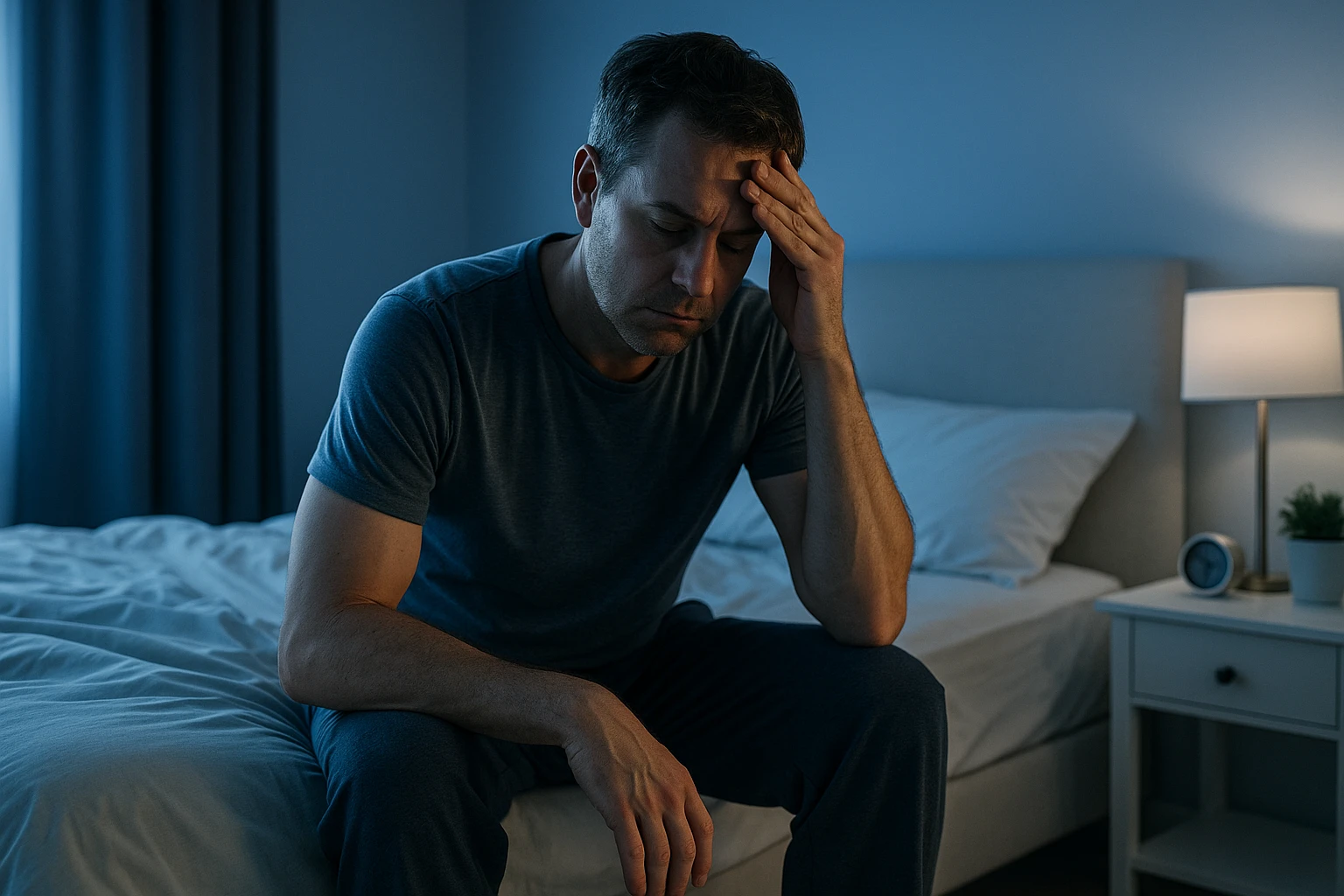Night Sweats: Symptoms, Possible Conditions, and Next Steps
Night Sweats
Night sweats refer to episodes of excessive sweating that occur during sleep. These episodes can be intense enough to soak sleepwear, bedding, or pillows. While they can be uncomfortable or disruptive to rest, night sweats are a symptom rather than a condition by themselves. This means they can happen for many different reasons, ranging from common and harmless triggers to underlying medical concerns. Understanding what night sweats feel like and when they might signal something more is an important first step in making sense of this experience.
How Night Sweats Feel
People who experience night sweats may wake up feeling overheated, damp, or chilled from moisture on their skin and clothes. Some notice that the sweating happens in cycles during the night, while others experience a sudden, intense burst of sweating. These episodes can interrupt sleep, leading to tiredness or discomfort the next day. The emotional impact should not be overlooked as well. Waking up unexpectedly wet or cold can feel confusing or frustrating, especially if it occurs repeatedly.
For some, the environment contributes to these episodes. A warm bedroom, heavy blankets, or sleepwear made from thick fabrics can trap heat and lead to sweating.
- Warm bedroom temperature
- Heavy or layered bedding
- Thick or heat-retaining sleepwear
However, in night sweats caused by internal factors, the sweating can occur regardless of room temperature or bedding choices. This is one clue that your body may be responding to something beyond external warmth.
Normal vs. Concerning Night Sweats
It is helpful to distinguish between occasional sweating during sleep and true night sweats. Sweating because the room is warm, a fan is off, or blankets are heavy is common and generally not a cause for concern.
- Occasional sweating linked to room temperature
- Sweating relieved by adjusting bedding or clothing
- One-time or infrequent episodes
True night sweats are different in that they happen even when the sleep environment is cool and comfortable. They may also repeat over time rather than being a one-time event.
- Episodes occur despite a cool environment
- Sweating is severe enough to require changing clothes or bedding
- Happens repeatedly over days or weeks
Persistent or unexplained night sweats are worth discussing with a healthcare professional. The presence of additional symptoms, such as fever, fatigue, or weight changes, can provide important clues and should be mentioned during a medical visit. While night sweats can sometimes be linked to underlying health conditions, many causes are manageable once identified. Recognizing when episodes are simply environmental and when they may need evaluation can help guide what steps to take next.
Why Night Sweats Happen
Night sweats can have many different causes, and understanding these can help make sense of why they occur. While the experience may feel the same, the underlying reasons vary from natural body changes to medical conditions or medication effects. In many cases, night sweats develop when the body’s internal temperature regulation shifts during sleep, leading to sweating even when the surrounding environment is comfortable. The following sections explain several common groups of causes.
Hormonal Shifts
Hormones play a key role in how the body manages temperature. When hormone levels fluctuate, the body’s temperature regulation system may become more sensitive, leading to episodes of sweating at night. Hormonal changes such as those that occur during menopause are frequent triggers of night sweats. During these changes, the brain may briefly misinterpret the body’s internal temperature, causing sudden warmth and sweating.
Hormonal shifts can occur at different points in life and for various reasons. Some people may notice night sweats during natural life transitions, while others may experience them in connection with changes in hormone-related treatments. Regardless of the specific cause, the result can be similar: the body increases sweating in an effort to cool itself.
- Menopause
- Perimenopause
- Hormone therapy changes
Infections and Immune Response
The body uses fever as part of its immune response when fighting infections. When an infection is present, internal temperature may rise during the night, and sweating can occur as the body works to cool itself. Infections, including systemic or febrile illnesses, can produce nocturnal sweating as part of this process.
These episodes of sweating may come and go depending on the stage of the infection. Some people also notice chills followed by sweating as their temperature fluctuates. In this setting, night sweats reflect the body’s effort to restore balance while responding to an internal stressor.
- Daytime or nighttime fever
- Alternating chills and sweating
- Sweating that varies as the illness progresses
Underlying Health Conditions
Night sweats can sometimes be linked to underlying health conditions. Malignancies, including some hematologic cancers, are part of the differential when evaluating persistent or unexplained night sweats. In these cases, sweating may occur along with other symptoms, which may develop gradually or be subtle at first.
Endocrine or metabolic disorders, such as thyroid-related conditions, are recognized contributors as well. When these systems are affected, the body’s thermostat can become overactive or dysregulated, leading to sweating during sleep. Identifying and addressing these conditions typically involves medical evaluation and guided care.
- Unexpected weight changes
- Changes in energy levels
- Other symptoms developing over time
Medication Effects
Some medications are known to list sweating as a side effect. These effects can occur because certain medicines influence how the body regulates temperature, circulatory responses, or hormonal balance. When this happens, sweating may occur during the day or night, but many people notice it most clearly while trying to sleep.
If night sweats begin after starting a new medication, or after a change in dosage, this information can be helpful to share with a healthcare professional. Because medication side effects are a well-documented cause of night sweats, adjustments may be considered if appropriate and safe. Night sweats related to medication are often manageable once recognized.
- New prescriptions
- Recent dosage adjustments
- Medications known to affect temperature regulation
When to Seek Medical Care and How Doctors Evaluate Night Sweats
Night sweats can be uncomfortable and concerning, especially when they occur often or without a clear explanation. While occasional episodes may not signal a serious issue, some situations call for attention from a healthcare professional. Understanding when to reach out and what to expect in an evaluation can help make the process feel more manageable and less stressful.
When to Seek Care
It can be helpful to notice patterns in night sweats, such as how often they occur, how severe they feel, and whether anything makes them better or worse. Changes over time can provide useful clues. However, there are certain signs that suggest a medical assessment is important. Night sweats accompanied by systemic symptoms such as fever or weight loss warrant prompt assessment. These additional symptoms may indicate that the body is responding to an underlying condition that should be evaluated.
Even if no other symptoms are present, persistent or unexplained night sweats can be worth discussing with a clinician. Sharing how long the episodes have been occurring, how they affect sleep, and any recent changes in health or routine can help begin the conversation. Some people find it supportive to keep a brief record of symptoms, including when they occur and how intense they feel.
- Night sweats that continue over time
- Night sweats accompanied by fever or unexplained weight loss
- Night sweats that disrupt sleep regularly
- Recent changes in medications or health status
- Difficulty identifying an environmental cause
What to Expect in an Evaluation
Healthcare professionals use a step-by-step approach when evaluating night sweats. To begin, clinicians rely on detailed history including onset, pattern, triggers, and medication review. They may ask when the sweating started, whether it occurs every night or only occasionally, and whether anything seems to bring it on. Information about recent stressors, travel, or changes in medication can also be useful.
After reviewing personal history and symptoms, the clinician may perform a physical examination. This can help identify signs that point toward specific causes. If needed, targeted laboratory tests guided by findings are preferred over broad screening. This means testing is chosen based on the patterns and information gathered, rather than ordering a large number of tests without direction.
- History and symptom review
- Physical examination
- Targeted blood tests, if indicated
- Imaging only when needed
- Symptom tracking to support clarity over time
Testing may include blood work and imaging when indicated by the clinical picture. Blood tests can provide information about immune response, hormone levels, or other internal functions. Imaging, such as a scan or X-ray, may be considered if certain conditions are suspected. Not everyone needs every type of test; the approach is individualized.
Tracking frequency and associated symptoms can aid diagnostic accuracy. For example, noting whether night sweats occur alongside fatigue, changes in appetite, or fluctuations in body temperature can help clarify possible causes. Sharing these observations supports the clinician in forming a clearer understanding of what may be happening.
Knowing what to expect can help reduce uncertainty. The goal of an evaluation is to understand the cause of night sweats and guide next steps in care. Many causes are manageable once identified, and seeking support when needed is an important part of caring for your health.
Treatment, Management, and Daily Comfort
Night sweats can feel disruptive, especially when they affect sleep or routine. The approach to managing them depends on understanding what is causing them. In some cases, night sweats improve once the underlying cause is identified and addressed, while in others, small adjustments to sleep habits and the environment can help reduce discomfort. The goal is to support both overall health and nightly comfort.
Treating the Underlying Cause
When night sweats are linked to a specific medical condition, treatment is directed at the identified underlying condition. This means that instead of treating the sweating alone, the focus is on addressing the factor contributing to the body’s temperature changes. As the underlying issue improves, the night sweats may lessen as well.
For those whose night sweats are related to medications, medication-induced night sweats may improve with clinician-guided adjustments. This could involve changing the dose, adjusting timing, or considering an alternative medication if appropriate. These decisions should be guided by a healthcare professional.
- Address underlying medical condition
- Discuss any new or adjusted medications with a clinician
- Share detailed symptom patterns at follow-up visits
Comfort and Sleep Support
While the underlying cause is being identified or treated, there are ways to help reduce discomfort and improve sleep. Environmental and behavioral measures can reduce discomfort though they do not replace etiologic treatment. These measures focus on creating a cool, breathable sleep environment and reducing factors that trap heat.
Simple changes may include selecting lightweight sleepwear, using breathable bedding materials, or adjusting room temperature. Some people find it helpful to keep a glass of cool water nearby or use a fan to improve airflow. Because these adjustments focus on comfort rather than cause, they can provide relief while medical evaluation or treatment is ongoing.
- Use light, breathable sleepwear
- Choose bedding made from cooling or moisture-wicking materials
- Keep room temperature cool and allow airflow
- Keep water nearby to cool down as needed
Finding a balance between addressing symptoms and seeking appropriate care can make living with night sweats feel more manageable. For many people, a combination of medical guidance and supportive home measures helps ensure both comfort and well-being.
- Night sweats are episodes of excessive sweating during sleep that may drench bedding or sleepwear.
- Hormonal changes, including menopause, are a common cause of night sweats.
- Infections that cause fever can lead to sweating at night as the body cools itself.
- Some cancers, including certain blood cancers, can present with night sweats as a symptom.
- Thyroid or other metabolic conditions can affect temperature regulation and lead to night sweats.
- Certain medications may list sweating, including nighttime sweating, as a known side effect.
- Persistent or unexplained night sweats should be discussed with a healthcare professional.
- Night sweats accompanied by fever or weight loss may indicate an underlying medical condition.
- Treatment for night sweats generally focuses on addressing the underlying cause.
Frequently Asked Questions
Is it normal to sweat a little during sleep?
Occasional sweating during sleep can happen, especially if the room is warm, bedding is heavy, or sleepwear retains heat. This differs from night sweats, which occur even in a cool and comfortable environment.
Why do some people experience night sweats during menopause?
Hormonal changes during menopause can temporarily affect how the body regulates temperature. This shift can cause sudden warmth and sweating during sleep.
Can infections cause night sweats?
Yes. When the body is fighting an infection, temperature may rise and fall during the night, leading to sweating as the body works to cool itself.
When should night sweats be checked by a healthcare professional?
Night sweats that are persistent, unexplained, or occur alongside symptoms such as fever or unintentional weight loss should be evaluated. These signs may indicate an underlying medical condition.
What will a doctor likely ask during an evaluation?
A clinician will ask about when the night sweats started, how frequently they occur, and whether any triggers or patterns are noticeable. They may also review medications and other symptoms to guide next steps.
Do all people with night sweats need medical tests?
No. Testing is chosen based on individual symptoms and medical history. When tests are needed, they are typically targeted rather than broad, and may include blood work or imaging if indicated.
Are there ways to stay more comfortable at night while figuring out the cause?
Small adjustments like using lightweight bedding, choosing breathable sleepwear, or improving room airflow can help reduce discomfort. These approaches focus on comfort but do not replace medical evaluation when needed.













